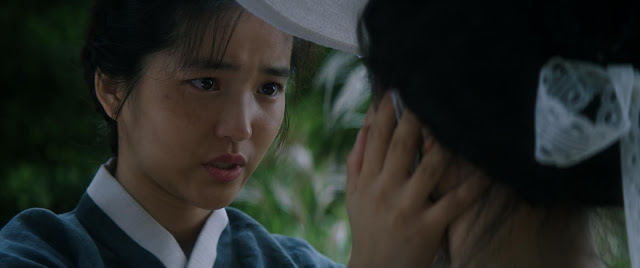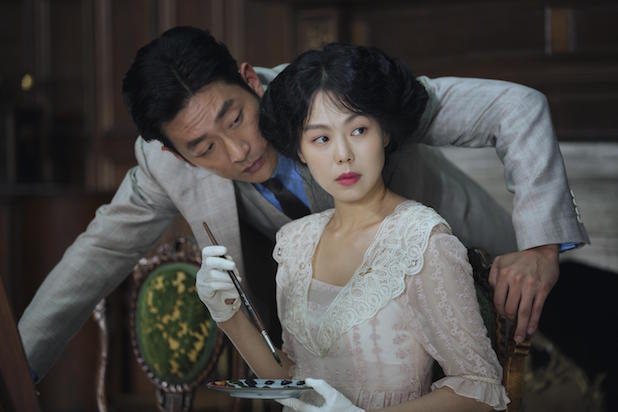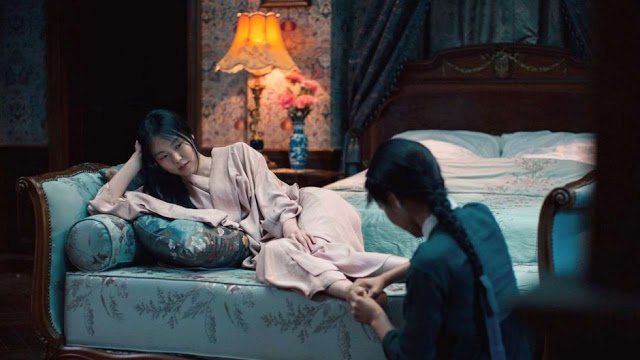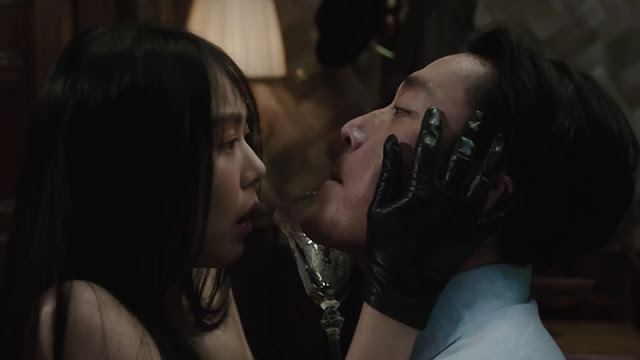Murder, deception, hot sex, cold death, severed fingers, poison cigarettes, vials of deadly blue liquid, monsters lurking in the basement—The Handmaiden, the exquisite and electrifying thriller from Park Chan-wook, has it all. A fire-breathing romance wrapped inside a stately period noir, it is simultaneously gorgeous and grotesque, a rampaging id colliding with a meditative superego. That may sound contradictory, but The Handmaiden doesn’t need to choose between beauty and excess. Over the course of this serpentine, deliriously entertaining film, excess becomes beauty.
Nothing about this frenetic, fastidious movie is traditional or predictable, except perhaps that it feels like the logical next step of Park’s career. Deemed a provocateur ever since he crashed onto the cult scene with Oldboy, Park has taunted and delighted audiences with his singular combination of immaculate craft and utter debauchery. For me, Oldboy strayed a bit too far toward the latter (I’ve yet to see the other two films in his “vengeance” trilogy, Sympathy for Mr. Vengeance and Lady Vengeance), but he smartly tweaked his formula with Thirst, a warped love story that used vampirism to explore the insatiable need for human connection. Then came the terrific Stoker, a cold-blooded tale of Gothic horror that Park set in the sweltering heat of the American South. Now he returns to his native South Korea, but while The Handmaiden finds Park going back home, it demonstrates that his virtuosic command of cinematic language is more vibrant than ever.
Transplanting Sarah Walters’ Victorian-era novel Fingersmith to post-World War I Korea, The Handmaiden initially presents itself as a straightforward con movie. The mastermind is Fujiwara (Ha Jung-woo, blithely amoral), a former peasant whose good looks and talent for flattery make him a natural swindler. He has his eye on the fortune of an heiress named Lady Hideko (Kim Min-hee), a shuttered, porcelain-skinned noblewoman who never leaves the grounds of her vast manor. Hideko is currently promised to her lecherous uncle (Jo Jin-woong)—a man who’s figuratively black of heart and literally black of tongue—but Fujiwara hatches a scheme. He will install Sook-Hee, a local pickpocket (Kim Tae-ri, excellent in her first feature role), as Hideko’s maid, and he will then pose as an aristocratic suitor, relying on Sook-Hee to manipulate her mistress’ feelings and nudge her into his arms. Then, he will have his new bride declared insane and abscond with her inheritance, giving Sook-Hee a small cut for her trouble.
Have I said too much? Trust me, I haven’t. The Handmaiden is diabolical in its plotting, with Park and co-writer Chung Seo-Kyung devising an intricate, looping narrative, one that repeatedly doubles back in time and shifts points of view. Its hairpin curves can be difficult to navigate, especially when it moves at such a lightning pace, but attempting to unravel its twists produces a giddy rush that feels intoxicating rather than disorienting. It helps that, unlike many con movies littered with double-crosses, Park plays fair with his audience. He doesn’t want to fool you—he wants to entrance you.
Mission accomplished. In some ways recalling Guillermo del Toro’s Crimson Peak—another period piece about an ingénue who finds herself trapped in a looming mansion—The Handmaiden is a ravishing motion picture. Working with his regular cinematographer Chung Chung-hoon, Park is typically stylish behind the camera; his precise framing and casual fluidity are enveloping, and he lights everything in dim, amber hues, giving the movie an ethereal, dreamlike air. The production design and costumes are so meticulous as to be transportive, invisibly pulling you back into the early twentieth century. And Jo Yeong-wook’s score is the finest I’ve heard this year, a rich and melodic symphony of singing strings and hushed piano.
This degree of refinement is critical, because it brings a sense of elegance to a movie that is, at its core, defiantly, indecently kinky. Blue Is the Warmest Color received considerable flak for the length and extremity of its lesbian sex scenes, but The Handmaiden is a different kind of hot. It views the sex between its lead female characters as a spiritual awakening, an unlocking of hidden desires and undiscovered truths. As their bodies thrash together, Sook-Hee and Hideko open up, and not just physically.
If that sounds perverted, just wait until you meet this movie’s men. At one point, The Handmaiden flashes back to Hideko’s childhood, where she acts as a sort of geisha, calmly reading aloud books of explicit erotica to a roomful of panting, pathetically horny sleazebags. It’s a sight of absolute filth, but rather than becoming complicit in it, Park cleverly condemns it. On a fundamental level—one that acquires surprising thematic force—this film is all about suppressed women triumphing over oppressive men, and in highlighting the moral depravity of its males, The Handmaiden slings a caustic rebuke at the entitlement of patriarchy and the ugliness of misogyny.
It may seem incongruous that I’m touting the feminist bona fides of a movie made by a man that gazes so intently at women’s bodies. (At one point, Park delivers a shot from the point of view of a vagina, because why not?) But Sook-Hee and Hideko are too well-developed as characters to serve as mere sex objects. And The Handmaiden, for all its heat and rage, is too alive, too narratively and visually purposeful, to be reduced to a single academic theme. In addition to functioning as a slippery thriller and a wily mystery, it is also very funny. Sook-Hee’s feeble attempts to praise Fujiwara to Hideko are a riot (“Your toenails have started growing faster since he arrived!”), while an attempted suicide, which initially plays as operatic, concludes with a deft, hilarious punch line.
It’s all a little nuts. But while The Handmaiden is disarmingly crazy—it exhibits a rare willingness to just go for broke—it never feels out of control. Rather, Park is in complete command throughout, marrying images of tangible lushness to a heightened tale of intrigue, deceit, and passion. In one magnificent scene, Sook-Hee storms through the mansion’s library (naturally, it’s crammed with sordid texts and vulgar illustrations), dumps countless books into a pit full of scummy water, and sets them ablaze, all while Hideko watches with placid curiosity. It’s a lovely, oddly cathartic moment, a venting of fury that is also a symbolic gesture of reclamation. Beyond that, it neatly encapsulates the mad genius of The Handmaiden, a movie which, with its extravagant boldness and sumptuous technique, embodies both Sook-Hee’s volcanic fire and Hideko’s serene beauty. It has the patience and the thoughtfulness to construct a towering, vertiginous puzzle, an ornate latticework redolent with pungent yearning. And then, once the painstakingly polished pieces are in place, it has the audacity to burn it all down.
Jeremy Beck is the editor-in-chief of MovieManifesto. He watches more movies and television than he probably should.




